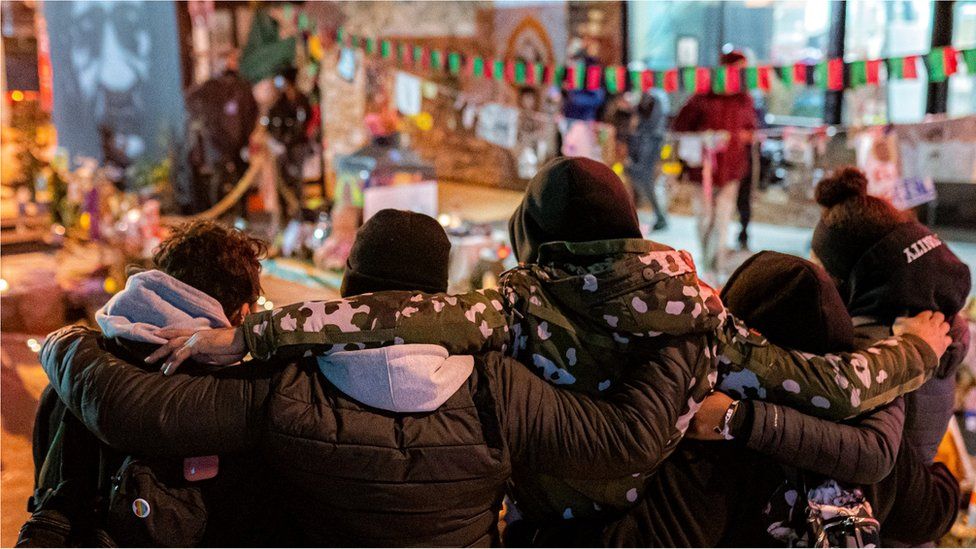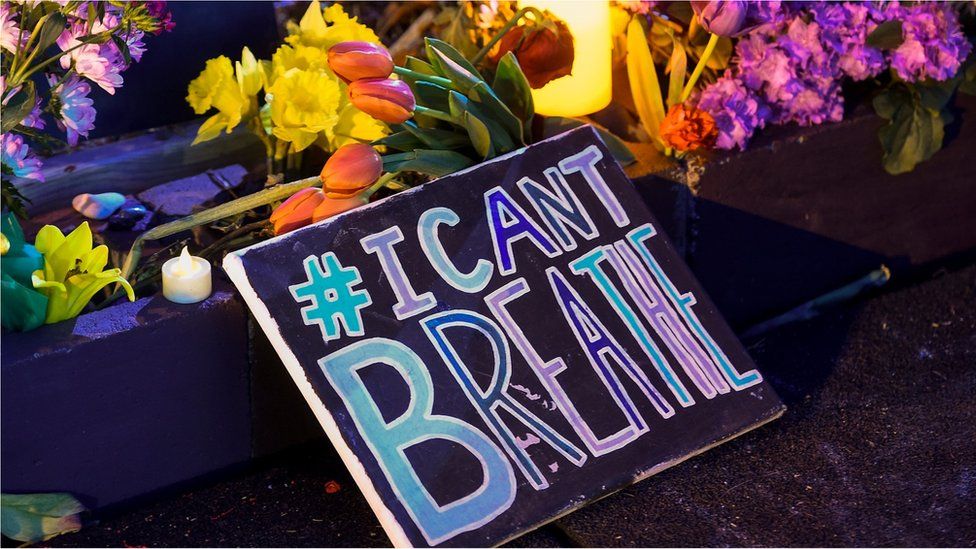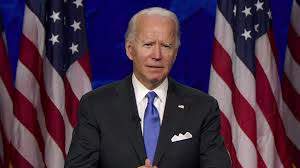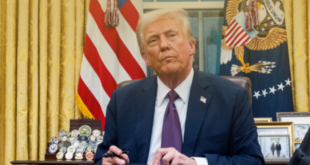US President Joe Biden has said the conviction of a former police officer in the killing of George Floyd “can be a giant step forward in the march toward justice in America”.
But he warned: “We can’t stop here”.
White officer Derek Chauvin was filmed kneeling on African-American Mr Floyd’s neck for more than nine minutes, sparking mass protests against racism.
He was found guilty on Tuesday of second-degree murder, third-degree murder and manslaughter.
Sentencing is likely to happen in two months, and Chauvin could spend decades in jail. He is expected to appeal against the verdict.
In a phone call with Mr Floyd’s family after the verdict was announced, the president was heard saying: “At least now there is some justice.”
In televised remarks shortly afterwards, Mr Biden said that such a verdict was “much too rare”.
“We can’t leave this moment or look away thinking our work is done. We have to look at it as we did for those nine minutes and 29 seconds,” he said.
Vice-President Kamala Harris urged lawmakers to pass the George Floyd bill aimed at reforming policing in the US.
“This bill is part of George Floyd’s legacy. This work is long overdue,” she said.
What other reaction has there been?
People gathered outside the courtroom and on the intersection in Minneapolis where Mr Floyd was killed to celebrate the verdict.
Cheers broke out, drivers honked their car horns and people blocked traffic chanting: “George Floyd” and “All three counts”, referring to the three charges of which Chauvin was convicted.
“It’s a good day in Minneapolis,” said 21-year-old Kenneth Nwachi. “It’s a blessing.”
One local resident told the Associated Press news agency she felt grateful and relieved, while another said: “There’s some form of justice that’s coming.”
Crowds also gathered in other cities to celebrate the verdict.
 IMAGE COPYRIGHTGETTY IMAGES
IMAGE COPYRIGHTGETTY IMAGESBut they also said that more needed to be done.
Police officers have rarely been convicted – if they are charged at all – for deaths that occur in custody, and the verdict in the trial has been widely seen as an indication of how the US legal system will treat such cases in future.
At a family news conference, Mr Floyd’s younger brother Philonise said: “Today, we are able to breathe again.”
The Floyd family’s lawyer, Ben Crump, said the conviction marked a “turning point in history” for the US.
“Painfully earned justice has finally arrived,” he tweeted.
Chauvin’s defence team has not yet commented on the verdict, but is expected to appeal.
According to reports, one of the most likely avenues of appeal is the huge publicity given to the case, with the defence team arguing that this might have influenced the jury.
Also, Presiding Judge Peter Cahill said on Monday that public comments by Democratic Congresswoman Maxine Waters could be grounds for an appeal.
Over the weekend, Ms Waters had urged protesters to “stay on the street” and “get more confrontational” if Chauvin was acquitted.
US defence lawyer Mark Geragos called the conviction a “preordained conclusion”, telling Fox News that “given the tsunami of coverage and public consternation, the best he ever could have hoped for was a hung jury”.
What happened in the courtroom?
It took the 12-member jury less than a day to reach their verdict.
Chauvin, whose face was obscured with a coronavirus mask, showed little reaction as the verdict was read, remaining quiet and looking around the room. His bail was revoked and he was led out of the courtroom with his hands cuffed behind his back.
The verdict followed a highly charged, three-week trial in which 45 witnesses took the stand and several hours of video footage were shown.
Several witnesses broke down in tears as they watched graphic footage of Mr Floyd’s death and described feeling “helpless” as events unfolded.
Expert witnesses on behalf of the state testified that Mr Floyd died from a lack of oxygen due to the manner of restraint employed by Chauvin and his colleagues.
Chauvin himself chose not to testify, invoking his right to not incriminate himself with his responses.
History turns on these kind of moments, and the conviction of Derek Chauvin will be seen as a landmark event in the ongoing struggle for black equality.
The video of George Floyd’s murder that went viral revealed to the world the scourge of police brutality, a disease America has never been able to cure. This verdict is unlikely to be a panacea.
It’s a tragedy of American history that acts of police violence have often been the spur for racial change.
In the early Sixties, the sight of police dogs lunging at protesters in Birmingham, Alabama contributed to the passage of legislation that demolished southern segregation. The pictures of police clubbing protesters in Selma, Alabama led to the 1965 Voting Rights Act.
But while the murder of George Floyd has brought about a racial reckoning, that’s a very different thing from saying its brought about racial reconciliation. African-Americans will see justice in this verdict, but so many are looking for fairness and equality in all the aspects of their lives.
What happened to George Floyd?
The 46-year-old bought a pack of cigarettes at a convenience store in South Minneapolis on the evening of 25 May 2020.
A shop assistant believed he had used a counterfeit $20 note and called the police after Mr Floyd refused to give the cigarettes back.
When police arrived, they ordered Mr Floyd out of his parked car and handcuffed him. A struggle ensued when officers tried to put a screaming Mr Floyd in their squad car. They wrestled him to the ground and pinned him under their weight.
 IMAGE COPYRIGHTEPA
IMAGE COPYRIGHTEPAChauvin pressed his knee into the back of Mr Floyd’s neck for more than nine minutes.
As he was being restrained, Mr Floyd said more than 20 times that he could not breathe, pleading for his mother and begging “please, please, please”.
When the ambulance arrived, Mr Floyd was motionless. He was pronounced dead about an hour later.
bbc.com
 Home Of Ghana News Ghana News, Entertainment And More
Home Of Ghana News Ghana News, Entertainment And More






